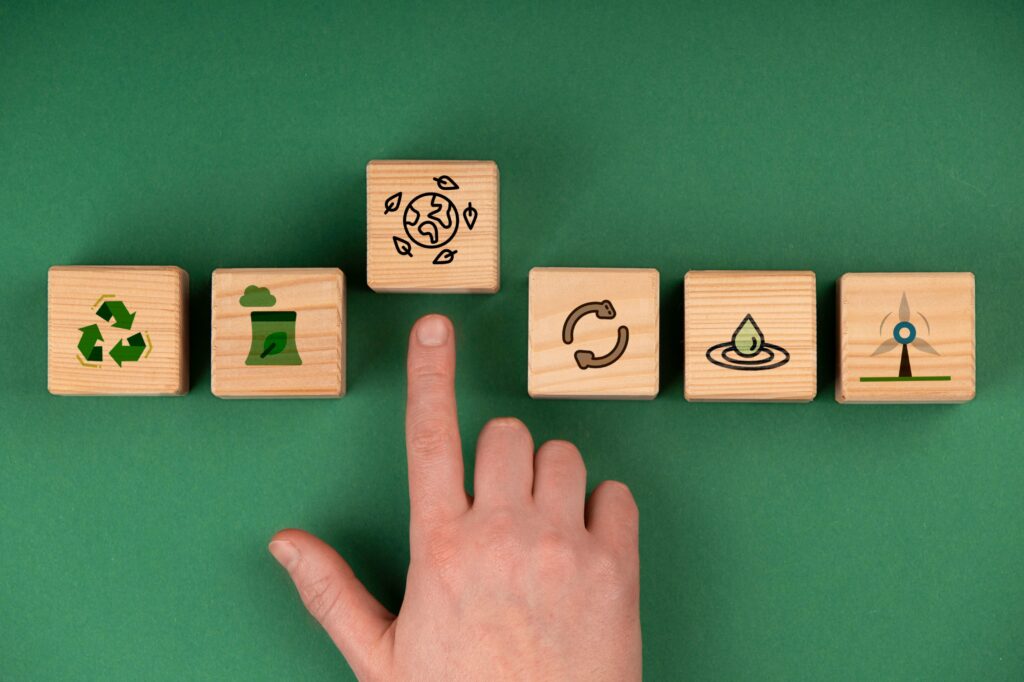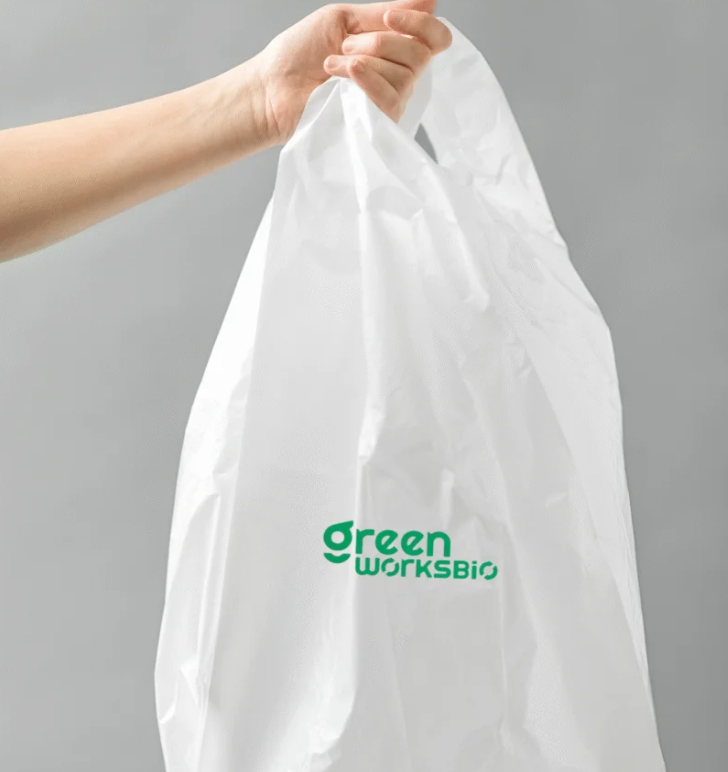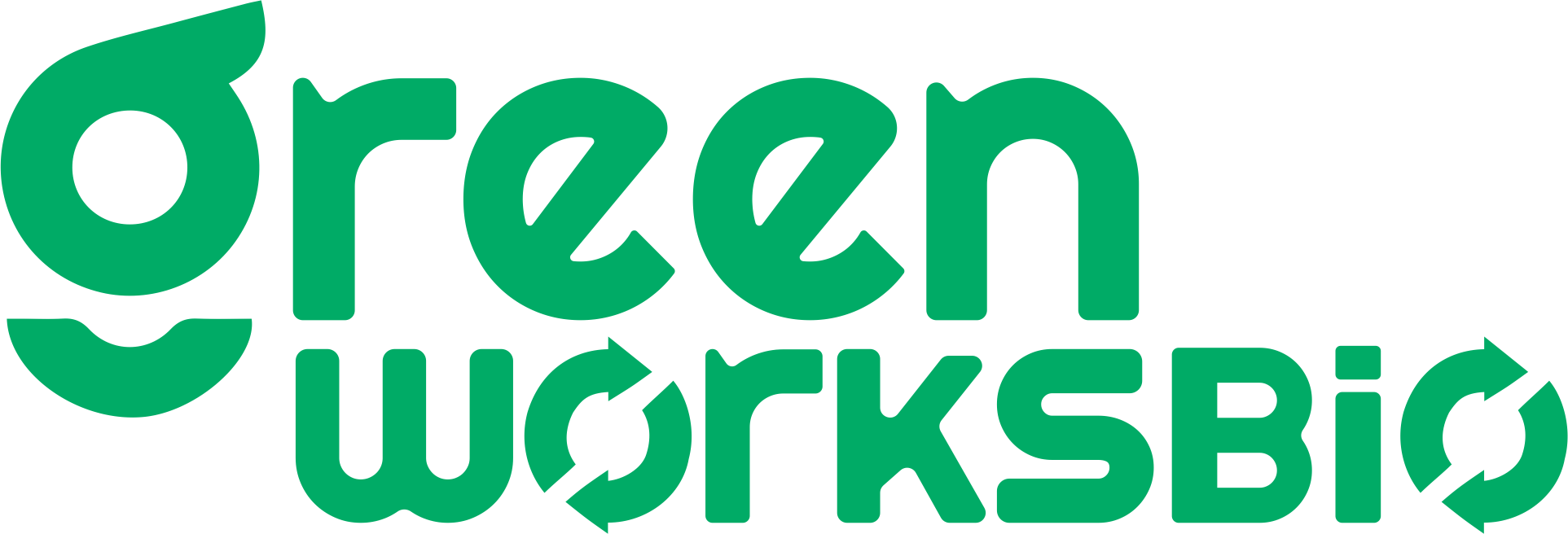| TLDR
Compostable Mailers: Greenworksbio’s certified compostable transparent bags are plant-based, durable, and decompose in 90–180 days. FSC-Certified Tissue Paper: A recyclable and dye-free substitute for plastic-coated gift wraps—lightweight and retail-ready. Water-Activated Paper Tape: Bonds well with boxes and is fully recyclable, making it a better option than plastic sticky tape. Recycled Mailers: Made from rLDPE or PET waste—lightweight, functional, and support circular use without using virgin plastic. Organic Cotton Totes: Reusable, compostable bags made from pesticide-free cotton, great for retail brands and repeat use. Biodegradable Air Peanuts: Natural, dissolvable cushioning that replaces harmful styrofoam—safe for aquatic environments. Corrugated Bubble Wrap: Cardboard-based cushioning that offers the same protection as plastic but is biodegradable and easy to recycle. Mushroom Packaging: Custom-molded from mycelium and agri-waste—fully compostable and ideal for premium, fragile items. |
|---|
If you’re overwhelmed by the environmental cost of plastic packaging, but unsure where to start, you’re not alone. From shipping supplies to product wraps, plastic has long been the default despite its harmful footprint. For businesses and creators looking to reduce waste, finding alternatives that are practical, scalable, and compliant can feel like navigating a maze.
This blog breaks it down for you.
We’ve picked eight plastic alternatives that work well for alternative packaging and are better for the environment, so you can keep your products safe without harming the planet. Whether you’re packaging food, apparel, or fragile goods, these solutions offer real-world usability with less impact on landfills and oceans.
Why is replacing plastic packaging important?

Plastic waste is a major threat to our planet. Only about 9% of plastic is ever recycled—the rest ends up in landfills, oceans, and natural habitats. It can take hundreds of years to break down, harming wildlife, polluting water, and even entering our food chain.
Switching to plastic alternatives isn’t just good for the environment—it’s necessary. Sustainable packaging reduces waste, uses fewer raw materials, and supports a circular economy where things are reused instead of thrown away. For businesses, it’s also a smart way to meet growing consumer demand for eco-friendly practices and stay ahead of evolving regulations.
What Are 8 Scalable Alternatives to Plastic Packaging?

Plastic alternatives are now a necessity, offering eco-friendly packaging without sacrificing quality. Let’s examine eight exciting ideas that help steer toward eco-conscious packaging solutions.
1. Can Compostable Transparent Bags Be a Replacement?
Greenworksbio provides CPCB-approved compostable transparent bags, crafted from PLA blended with PBAT, designed to match plastic mailers in durability. Compostable transparent stand-up bags are industrially certified (ISO 17088, EN 13432, ASTM D6400) and dissolve into compost within 90–180 days.
- Renewable plant-based materials (corn starch/cellulose)
- Food-safe, moisture-resistant, and hot-fill compliant
- Free from petroleum fillers and no toxic residues
2. Why Choose FSC-Certified Tissue Paper Over Wrapping Paper?
Plastic-coated wrapping paper is often unrecyclable. FSC-certified tissue paper provides a cleaner alternative made from responsibly sourced or recycled pulp. It is compostable, acid-free, and free from synthetic dyes.
- Ensures traceability to well-managed forests.
- Breaks down naturally without chemical leaching.
- Lightweight and customizable for retail and gifting.
Choosing FSC-certified wrapping materials improves recyclability while boosting your brand’s green credibility..
3. Is Water-Activated Paper Tape a Better Option Than Plastic Sticky Tape?
Traditional plastic tapes hinder recyclability. Water-activated kraft paper tape, which uses starch-based adhesives, bonds securely and decomposes naturally after use.
- Eliminates plastic residues during recycling.
- Compatible with cardboard and paper-based packaging.
- Strong enough to withstand logistics stress.
This small change significantly improves end-of-life recyclability and reduces landfill waste.
4. How Do Recycled Mailers Compare to Single-Use Plastic?
Made from post-consumer recycled plastics like rLDPE or PET, recycled mailers help reuse existing materials instead of relying on new fossil resources.
- Supports circular economy by repurposing existing waste.
- Reduces energy use and emissions in manufacturing.
- Often eligible for take-back or second-use systems.
Recycled mailers are lightweight, functional, and a smarter solution for businesses aiming to cut plastic dependency.
5. Can Organic Cotton Totes Replace Plastic Shopping Bags?
Over 500 billion plastic bags are used each year globally—most of which are single-use. Organic cotton totes are reusable, compostable, and harvested without harmful chemicals.
- Made from GOTS-certified cotton.
- Encourages reusability and brand loyalty.
- Can be custom printed with water-based inks.
Cotton totes replace disposable habits with sustainable ones, making them ideal for conscious retail brands.
6. Are Biodegradable Air Peanuts a Viable Alternative to Styrofoam?
Styrofoam packing solutions are out; biodegradable air peanuts are in! These lightweight packaging fillers, made from natural sources, such as cornstarch, break down through exposure to microorganisms and dissolve in water.
- Tested to perform safely in transit without risking fragile goods.
- Reduces harm to aquatic systems by eliminating petrochemical content.
- Aligns with efforts to minimize food waste emissions.
7. Is Corrugated Bubble Wrap a Viable Substitute for Plastic Bubble Wrap?
Corrugated wrap, made from layered recycled cardboard, offers similar cushioning benefits as plastic bubble wrap but with improved sustainability.
- Easily recyclable along with paper packaging.
- Biodegradable and free of polymers.
- Provides airflow and impact resistance.
Ideal for eCommerce brands wanting plastic-free packaging without compromising product protection.
8. Why Wrap Delicate Goods in Mushroom Packaging Instead of Plastic?
Mushroom packaging, created from mycelium and agricultural waste, forms a custom-fit mold around fragile products and decomposes within weeks.
- Fully compostable and safe for soil and marine environments.
- Naturally antimicrobial and insulating.
- Grown in molds using minimal energy.
A future-facing material, mushroom packaging supports carbon neutrality and is especially impactful for brands focused on innovation and eco-leadership.
Greenworksbio: Where Sustainability Meets Supply Chain Reliability
Greenworksbio offers certified compostable packaging solutions—designed to perform across high-volume, fast-moving supply chains. From courier bags and food trays to shopping bags and cutlery, our PLA+PBAT-based materials are built for durability, compliance, and scalability.
Backed by CPCB, EN 13432, ISO 17088, and TÜV Austria certifications, our products meet global environmental standards while supporting India’s waste infrastructure. Whether you’re shipping nationwide or managing last-mile delivery, Greenworksbio helps you cut plastic waste without slowing down operations. Contact us today.
Conclusion
Switching to plastic alternatives for packaging isn’t just a trend—it’s a practical step toward reducing waste and future-proofing your business. Whether you’re using compostable mailers, mushroom packaging, or FSC-certified tissue paper, each change brings you closer to cleaner operations and stronger customer trust. These alternatives are scalable, certified, and ready to support real-world logistics without compromising on quality or performance. The time to act is now—and with the right choices, your packaging can protect both your products and the planet.
Frequently Asked Questions
What are the most affordable plastic alternatives in India?
Greenworksbio’s products include some of the most affordable plastic alternatives in India. Jute, bagasse, and cardboard are among the top low-cost options. They are not only economical but also widely available, making them practical choices for businesses and consumers seeking sustainable packaging solutions.
Are plant-based packaging materials safe for food products?
Yes, plant-based materials like bioplastics are safe for food delivery. Made from natural raw materials, they reduce food waste and comply with standards for safe packaging. However, ensuring appropriate usage conditions is essential to avoid contamination.
How can businesses transition to sustainable packaging?
Transitioning involves assessing packaging needs, embracing alternative materials, and integrating the circular economy in operations. Businesses can cut plastic waste by partnering with suppliers offering sustainable alternatives and running pilots for new solutions.
Which plastic alternatives are easily recyclable in India?
In India, polyethylene terephthalate, cardboard, and wood fiber are some of the most recyclable plastic alternatives. They lower environmental impact and are supported by existing recycling infrastructure.
Do plastic alternatives meet government regulations?
Yes, many plastic alternatives adhere to US government regulations, ensuring compliance for pesticide-free and sustainable choices. These materials meet eco-label standards, underlining their credibility as substitutes for traditional plastics.

